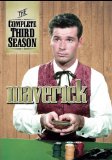| Reviews & Columns |
|
Reviews DVD TV on DVD Blu-ray 4K UHD International DVDs In Theaters Reviews by Studio Video Games Features Collector Series DVDs Easter Egg Database Interviews DVD Talk Radio Feature Articles Columns Anime Talk DVD Savant Horror DVDs The M.O.D. Squad Art House HD Talk Silent DVD
|
DVD Talk Forum |
|
|
| Resources |
|
DVD Price Search Customer Service #'s RCE Info Links |
|
Columns
|
|
|
Maverick: The Complete Third Season (Warner Archive Collection)
The beginning of the end. Warner Bros.' Archive Collection line of hard-to-find cult and library titles has released Maverick: The Complete Third Season, a 6-disc, 26-episode collection of the hit ABC Western comedy drama's 1959-1960 season. What was once one of the most influential--and wildly entertaining--oaters on the tube, now settles down into a distressingly hit-and-miss anthology as Maverick's brilliant guiding hand, producer/writer Roy Huggins, is replaced by Coles Trapnell...and a visibly distracted James Garner keeps one eye on the "exit" door. No extras for these good-looking fullscreen black and white transfers.
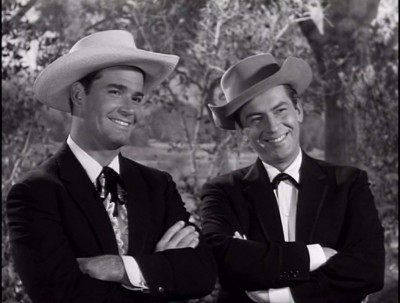
For those who haven't seen Maverick, its set-up is as elusive as the Maverick brothers themselves. In post-Civil War America, handsome, dark-haired, rootless gambler Bret Maverick (James Garner) travels from saloon to river boat, from California to Texas to New Orleans to Mexico, looking for the next poker game and his next buck. Flush one minute and skint the next, adventurer Bret keeps a $1000 dollar bill safety-pinned to the inside of his coat for insurance (just like his Pappy always told him to do), while wearing a sardonic, often bemused countenance that masks a heart of gold. Bret, an expert card sharp and bluffer ("fair" with a pistol, too), never cons anyone who isn't trying to con him first, and any ill-gotten gains he receives from his various ploys, he usually distributes to the swindlers' victims...after taking his cut to cover expenses, of course. Female attention is certainly welcomed by Bret, but he doesn't trust it, and he's usually proven right when the various gorgeous ladies that fall for the handsome Bret turn out to be cheats, liars, or virtuous women forced to fib to get Maverick's help in their schemes. Oh, and Bret has a brother, too, that he runs into from time to time: fair-haired, equally handsome, equally rootless Bart Maverick (Jack Kelly). He lives and loves the same way Bret does (he even keeps that same 1k spot pinned to his jacket): with one eye on the cards and another on the exit door when a lovely temptress figures to pull a fast one on him.
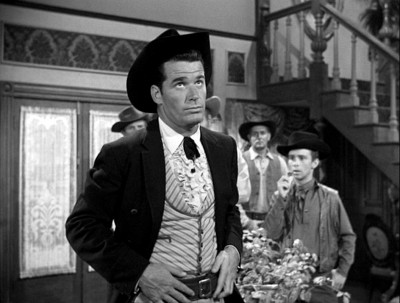
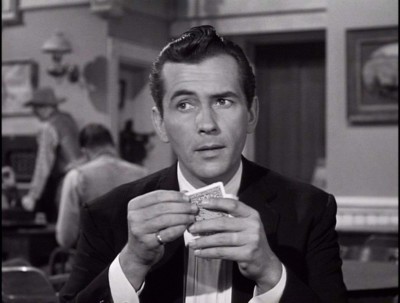
I somehow missed out on reviewing the second season of Maverick (as my Pappy used to say, "Don't get mad, just get the next review,"), but I did write about the brilliant first go-around of the influential, iconic Western, and by comparison, this third season of Maverick clearly shows a series' whose focus has wandered. When factoring in the aesthetic attrition that could and did often swamp the hamburger-grind production of a weekly hour-long network TV show back during this period (sun up to sun down shoots, every day, for 8 days straight in Maverick's case), you have to give credit, first and foremost, to the show's supervising producer for whatever degree of "continuity of quality" the show possessed from week to week. Considering how many memorable, noteworthy episodes Maverick featured during its first two seasons, under producer/writer Roy Huggins's guidance, it's not a big stretch to lay most of the blame for this third season's hit-or-miss tone on Huggins' departure. Star James Garner, in his autobiography, The Garner Files: A Memoir, is surprisingly dismissive of Huggins ("He was a nice enough guy, I suppose," is about the best he can summon up), but in writing about his three-year starring stint on Maverick, Garner only focuses on the notoriously penurious contract he had with Warner Bros. when discussing his decision to leave the series after this go-around. He states if he had been offered a decent salary, he would have stayed with the show indefinitely (incredibly, Garner was only making $1,250 a week by this third season, when his Sunday night competition--Ed Sullivan and Steve Allen--were making in the neighborhood of $25,000 a week). Garner didn't like it, but he put up with the physically punishing demands of his contract; he was expected to work 52 weeks a year, doing everything from shooting Maverick to starring in motion pictures like Up Periscope to making sometimes humiliating personal appearances, all for that measly $1,250 a week. However, when Warners got even greedier and laid him off without pay during a writers' strike in the middle of Maverick's second season, Garner did the unthinkable: he sued Warners for breach of contract, and later won, breaking his contract and in the process, putting one more nail in the coffin of the on-its-last-legs "studio system" (Warners would come back to Garner with a 5K a week offer to stay with Maverick for the fourth season--along with, he claims, Henry Kaiser's 1/3 share of the show's back end--but Garner passed). Garner off-handedly states in his book he probably wouldn't have had much of a big-screen career if he had stayed with Maverick, but importantly, he doesn't say why. The reason, though, seems pretty clear with this third season: Maverick, missing Roy Huggins, had already begun to slowly flounder prior to Garner's exit.
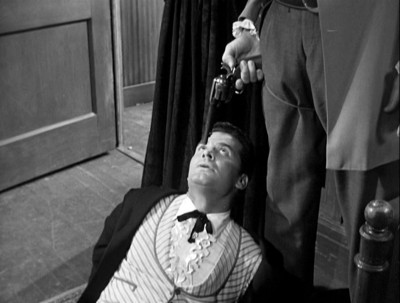
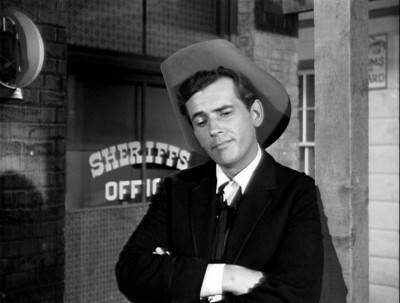
As I wrote in my first season review, Maverick is one of those "legendary" TV titles that gets equal respect (to this day) from both critics and the viewers, something that happens less often than you would think (for more detailed background on the show's initial aesthetic, you can read my review of the first season here). TV audiences back in 1957 responded immediately to Maverick's relatively complex scripting, its delightfully off-center characters, and its almost indescribable atmosphere of "something new" in a particular genre--if not "new" in storylines, for many were borrowed and adapted, then "new" in approach--that low, buzzing, electric excitement a viewer feels when they realize they're watching something..."other" than what they've watched before. That buzz, though, must necessarily wear off if a show fails to continue to evolve and to surprise; with this third season of Maverick...the surprises just aren't all that surprising anymore. In other words, you can have Bret throw up his hands and play the coward before he punches out someone, or Bart romance yet another pretty lady who turns out to be a crook, or execute the Maverick-patented quadruple-cross flim-flam scam only so many times, before the audience gets out ahead of you, enjoying for sure what you're doing...but already anticipating where you're going to wind up in an average episode. Just to be clear: there are still quite a few thoroughly enjoyable outings here for Maverick's third season. However...none of them really knocked me out like entries from the previous two seasons (probably as much to do with the familiarity with, and repetition of, the format's conventions, as with the quality of the writing itself) and most distressing of all, there were more than a few routine and even desultory episodes--a first for my experience with Maverick (and apparently an indicator of what was to become the norm in seasons four and five).
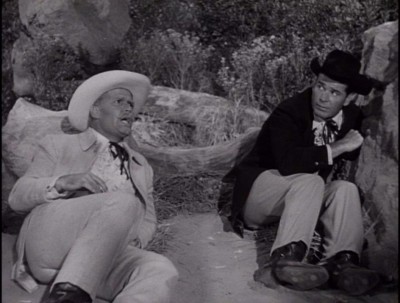
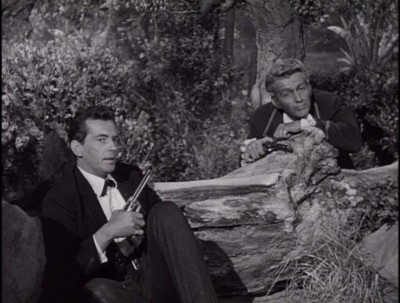
The season opener, Pappy, is as good an example as any of this situation. Written and directed by series regular, Montgomery Pittman, the novelty of seeing Garner portraying the famed "Pappy" of Bret's and Bart's choice epigrams is both funny and disconcerting. Sure Garner has some fun playing dress-up in old age makeup (and true to form, they only let Kelly become "Uncle Bentley" for a few seconds during the fast fade-out). However, his "Pappy" isn't a particularly strong or memorable character in and of itself--a character made concrete when he should have stayed fictitious (wasn't it more fun to hear Bret and Bart make those sayings up, with the viewer never really believing there was a legendary "Pappy," than to have him appear in the disappointingly ordinary flesh?). Reportedly, former producer Huggins (who was forced to leave the series due to illness) hated that Coles Trapnell led-off the season with this misstep, but even more troubling is the rather routine nature of the story itself, with its familiar scamming plot enlivened only by Garner and Kelly hamming it up (and is it me, or is there a lot more cutesy-pie "Mickey Mousing" of the score to give the episodes this season a forced, cartoonish feel?). Kelly episode Royal Four Flush isn't much better, with Kelly's efforts to skim off some cream from a silver scam made enjoyable mostly by Kelly's increasingly ingratiating performances (contrary to what most Maverick fans would state, I find handsome, smooth Kelly just as amusing and personable as Garner--maybe more so, admittedly, after reading Garner's off-putting autobio: it's always better not to know too much about the real people behind those facades...). Much, much better is The Sheriff of Duck 'n' Shoot, scripted by William Driskill, which has Bret blackmailed into becoming a sheriff of a small town...a town where all the sheriffs wind up dead (the series will utilize this blackmailing framework more and more as the season wears on). Garner gets to flat-out declare the definitive version of Bret's personal creed ("I'm unreliable. I'm a terrible shot. And this I mean most sincerely: I have been for as long as I can remember, a coward,"), while romancing yet another duplicitous lady: this time it's pretty Peggy McCay in a good turn (Chubby Johnson is funny, too, as the town's deputy). Best of all: Bart shows up and offers to help Bret out of jail...just as soon as Bret pays him what he owes (viewers loved it when the suspiciously amoral Maverick brothers cynically sparred like that).
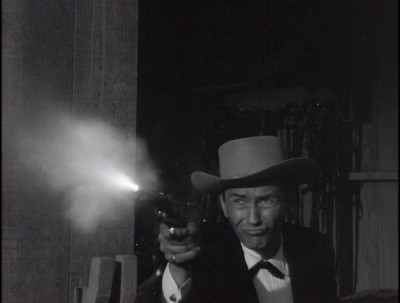
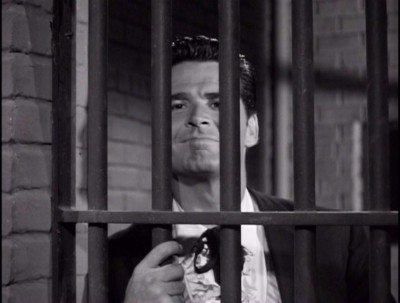
Writer/director George Waggner comes up with a winner with You Can't Beat the Percentage, where always-welcome Gerald Mohr shows up as a laughing cheat who battles Bart for control of a gambling saloon. Multiple double-crosses here, along with good work between Kelly and sexy Karen Steele (seductive Kelly can believably deliver a line like, "You have an eye-filling strut," to Steele; I wouldn't have bought that one coming out of Garner). As is typical with most of Kelly's outings, it's a bit more serious than it has to be (I suspect Garner had his pick of the scripts, choosing the funnier ones, and who can blame him?). An excellent example of this comes in The Cats of Paradise, written by Wells Root and Ron Bishop, an amusing entry with a socko central premise: cute little liar Mona Freeman (as reoccurring character, Modesty Blaine) wants to bilk Bret out of 5K to buy cats for a rat-infested mining town...or does she? Three solid subplots keep this one going at a breakneck pace, including Freeman's deadly shenanigans (I have to say Freeman's bright, homicidal chirpiness is hilarious here), Buddy Ebsen's rigid, superstitious sheriff who's willing to kill anyone who pisses him off, and a very funny parody of Richard Boone's Paladin by Lance Fuller, as "Faro Jack Norcross." That slapstick ending with the shoe-polished cats is right out of early live-action Disney...and very funny. Scripter Leo Townsend's take-off on Dickens, A Tale of Three Cities, is a particularly good vehicle for Kelly, who shines with sexy-as-hell Patricia Crowley in a light, enjoyable outing where Bart is locked up yet again (how many times are they locked up in jail this season?) while trying to help innocent thief Crowley. Kelly looks like he's enjoying kissing the delectable Crowley (who in their right mind wouldn't?), while his amusing double takes and mugs are given plenty of opportunities when he addresses a ladies' social...for a free lunch (as a "reformed" sinner and gambler), and when he makes himself quite at home in his comfy, homey jail cell (Ben Gage does a rather flat take-off on James Arness' Marshall Dillon that didn't deliver, unfortunately).
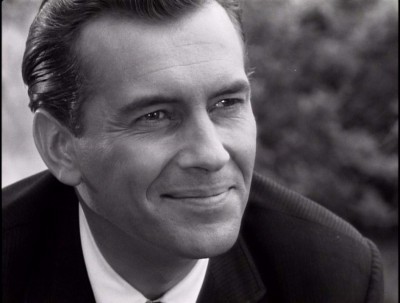
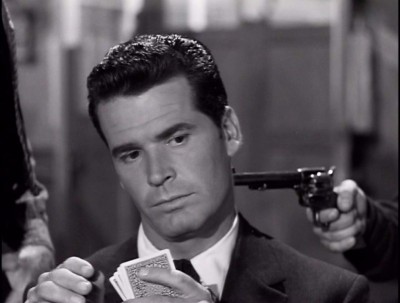
Full House, from scripter Jerry Davis, has a few surprisingly modern touches (I love the pre-What's New, Pussycat? on-screen graphic of "$73,000" pasted over Garner's head as he calculates how much reward money he could get turning in all those crooks) in this "super villain" mash-up. Considering the possibilities, though, of having real-life killers like Billy the Kid (Joel Grey), Belle Starr (sexy Jean Willes), and Cole Younger (Gregory Walcott) interacting with fictional Bret Maverick, I expected more elaborate hijinks than Davis delivers here, as the scam sorta peters out at the end (Garner's pretty good throwing that pistol around; suave Robert Lowery gets the biggest laughs as "The Brain" Foxy Smith; while Nancy Kulp, in a small bit, delivers as a nosey waitress). Catherine Turney's intriguingly-titled The Lass with the Poisonous Air couldn't be more familiar and quite frankly dull, unfortunately, except whenever heartbreakingly beautiful Joanna Moore turns that Renoir-worthy face straight into the camera (it's only when that brittle, scratchy voice breaks out does the illusion shatter). The Ghost Soldiers, from Robert Jacks and Richard Carr, isn't much better; what could have been an interesting Rashomon take-off about various versions of an Indian attack on a cavalry fort, turns into a rather humdrum siege episode marked only by Bret's constant whining about getting out (Garner's calculated coward/pragmatist/survivor shtick can become unaccountably irritating at times).
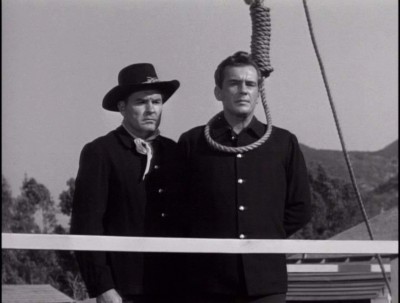
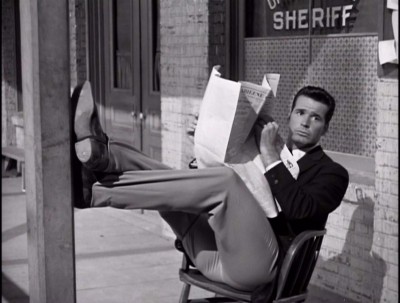
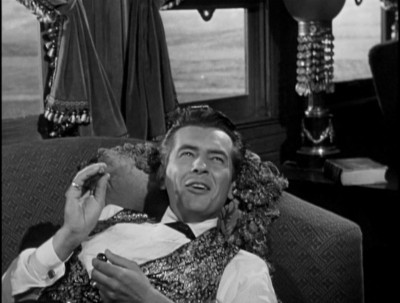
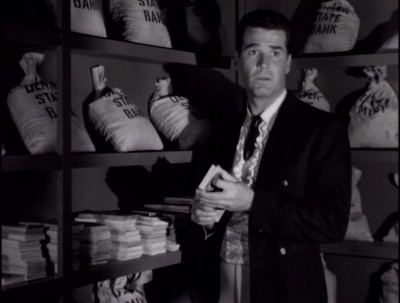
Trooper Maverick, from William Driskill, is a schizophrenic entry, part slapstick service comedy (Kelly, again, is quite good hamming it up with the physical gags) and part fort/cavalry spy outing, with Kelly blackmailed into becoming a spy to ferret out a fort's traitor. The mix of tone isn't bad; the only misstep is the finale, with the all too-obvious P.C. "profundity" of Tony Young's Indian brave embracing White ways and rejecting battle when he sees how ugly Suzanne Lloyd's vengeance is, failing to impress (her last-minute conversion is just as unconvincing). Leo Townsend comes up with another winner in Maverick Springs (many fans have pointed out that this and Maverick's most famous episode, Shady Deal at Sunny Acres, are the inspiration for The Rockford Files' beloved The Great Blue Lake Land Development Company episode). Maverick Springs is the kind of episode that immediately springs to mind when you think of the typical Maverick outing, with handsome, fast-talking Bret confidently conning everyone in sight...all in the service of helping out kindly cattle queen Doris Packer. King Donovan is funny as the weaselly wayward brother of Packer's, while Tol Avery does what he does best: intimidate with that girth and those mean little eyes (well put together Kathleen Crowley is amatorially impressive here). Leonard Praskins reworks Key Largo for The Goose-Drownder, one of the best vehicles for Kelly this season. Holed up in the Silverado ghost town with Richard Long's Gentleman Jack Darby during a monsoon, The Arapaho Kid (H.M. Wynant) arrives with his gang on a stagecoach, and Bart has to stay one step ahead of the killer...with the help of former flame, Fay Spain. Any episode that has a character named Red Herring gets an automatic pass from me, but The Goose-Drownder is particularly intriguing because at its end, it appears that Bart Maverick, that resolutely noncommittal bachelor, declares unrequited love for former one-night stand Spain. Do we believe it? It's filmed straight, and Kelly is quite convincing...or is all an elaborate snow-job to save his neck (is that why Darby looks so guiltily at Bart after the declaration?). Impossible to say...and that's what makes the episode so interesting. It's too bad Maverick's new producer didn't keep any of the frequent reoccurring guest stars from the previous seasons like Long's "Darby" and Leo Gordon's "Big Mike McComb;" not only were they interesting characters in their own right, they played nicely off the two leads while offering a bit more viewer "family" continuity in the anthology format (most criminal of all was the network's blindness in not giving talented, insanely attractive Diane Brewster her own show--or at least another leg of the Maverick anthology--with her absolutely fascinating "Samantha Crawford" character).
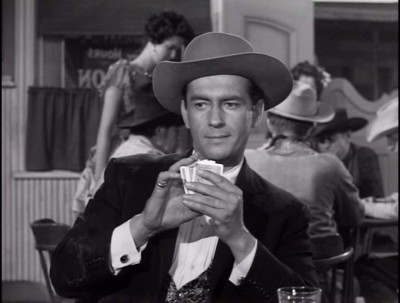
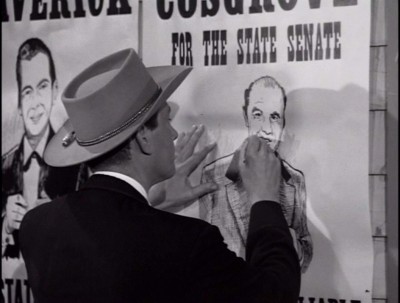
A Cure for Johnny Rain, from Leonard Praskins, is a dizzyingly little outing, made funny by the unendingly repeated bit of William Reynolds blacking out and coming-to, forgetting and remembering why he's a highwayman, with Bret frequently caught in the middle. Reynolds, whom I know from his (largely silent) role in The FBI, is quite funny as the curiously out-of-it Johnny (he could have been an amusing reoccurring character, as well)...but I don't understand the gaffe of his getting shot in the back by Dolores Donlon, only to be roused by Bret without a scratch (did I miss something there?). The Marquessa, however, is a predictable Anastasia-like plot about a gang, intent on grabbing Bart's newly-won cantina, by floating Adele Mara as Spanish royalty...which she may just be. The Cruise of the Cynthia B isn't any more original--just a take-off on Christies' And Then There Were None set on a paddle boat, but it is distinguished by the expert, atmospheric direction of Hollywood pro Andre de Toth, with Mona Freeman welcome back as crazy little liar/killer? Modesty Blaine. And while we're ripping off stories left and right, you might as well include Herman Epstein's Maverick and Juliet, which combines, delightfully, Shakespeare and the Hatfields and the McCoys feud for a backwoods passion play that features an epic poker battle between Bret and Bart (I know it would have defeated the purpose of the two separate production teams, but it's a shame Garner and Kelly, who work so well together, didn't get more episodes like this). Maverick and Juliet is yet another Maverick outing that subverts the notion of Western "honor," making such traditional vengeance-seeking family codes like the Montgomerys and the Carterets (yep...) seem not only foolish but deadly.
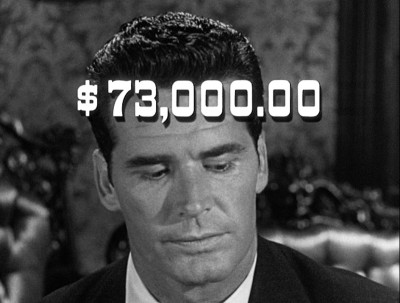
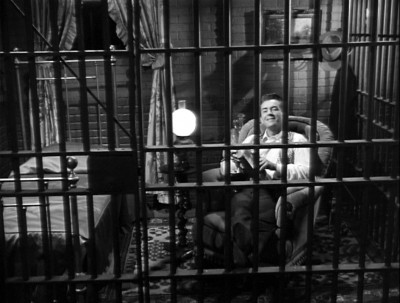
Leo Townsend, arguably the most consistent contributor this season, pens The White Widow, a Kelly outing that's nicely structured, featuring a first-rate fistfight (that Bart loses), and an excellent turn by Julie Adams as a banker who may or may not have Bart's best interests at heart. Guatemala City on the other hand, from Leonard Praskins, based on a story, ironically, from Roy Huggins and Coles Trapnell, is arguably the worst entry this season for the simple reason that under no circumstances should Bret or Bart appear paternalistic. I don't tune into Maverick to see a kiddie show. I don't want fun-lovin', sex-starved, emotionally distant Maverick to ever want a kid. I'm not watching Maverick Knows Best, so this story of Bret cottoning to a little orphaned girl (Linda Dangcil, in a grating performance) is seriously misguided from the get-go. Much better is The People's Friend, a political mystery from Robert Wright, that sees Kelly to excellent advantage subbing for a wounded politico in a stage Senate race. Quite a few amusing moments, including Kelly waiting impatiently for his royal flush to be dealt; his statement, "Therefore, I choose not to run," (pretty Merry Anders deadpans, "That statement will not go down in history,"); and best of all, his surreptitious graffiti on his opponent's posters. Ron Bishop and Root Wells' A Flock of Trouble has Garner in a trim, funny outing about sheepherders versus cattleman, with Bret, naturally, stuck in the middle...while looking to make a buck himself (the bit with everyone waiting for the dog to sniff out the sheep traitor is priceless).
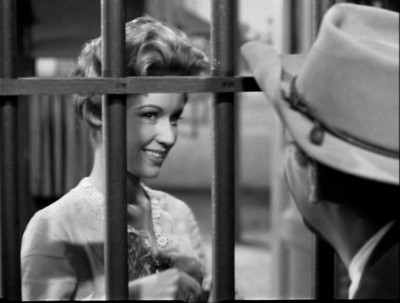
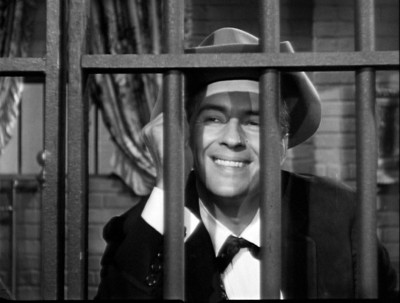
Jack Kelly's last outing this season, Iron Hand, from Gerald Drayson Adams, is also one of his best, in this suspenseful tale of the murderous half-breed Joe Vermillion (perfectly played by familiar villain, Anthony Caruso), who possesses an iron hand that can crush a man's skull with one swipe (a marvelous cartoony element to the story). A nicely-integrated episode, with serious and comedic moments in equal measure (one minute Kelly is engage with Susan Morrow in some complicated sexual/business shenanigans, the next, and Indian chief is blown up like Butch in a Droopy cartoon), and an excellent cast, including Morrow, Anthony Eustrel, and a young Robert Redford (Kelly hits all the right notes as negotiates deal after con after swindle to keep his $5,000; it's too bad Garner gets the final three episodes). The Resurrection of Joe November, from Leonard Praskins, is a light, amusing caper set at Mardi Gras, is certainly busy enough...if a tad familiar, with scheming Joanna Barnes amusing as a German baroness scheming to get her hands on some diamonds (angel Nita Talbot, unfortunately, isn't used well here...she's too broad). Leo Townsend's The Misfortune Teller (great title), sees Kathleen Crowley return as funny, sexy turn con artist, Melanie Blake, in this agreeably criss-crossing tale that has Bret desperately trying to clear his name before a small town hangs him (that Ben Gage, though, in his dopey Matt Dillon parody, is remarkably unfunny...Esther Williams was right). Finally, the season winds down with another delightful Robert Wright outing, Greenbacks, Unlimited, a charming, funny bank robbing tale that's perfectly suited for Garner's expert underplaying. The central plot mechanism--kindly Gage Clarke "borrows" money from the adjacent bank to finance his gambling--is wonderfully simple and yet it yields big laughs when safecracker John Dehner gets in on the act (his constant exasperation at finding the vault empty is hilarious). A leftover Garner episode from this production run would be held over for the fourth season of Maverick, before Roger Moore signed on, with the series lasting a further two seasons. For many viewers, however, Maverick ended with this last episode...and maybe even before that.
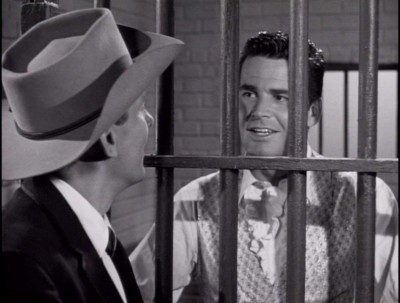
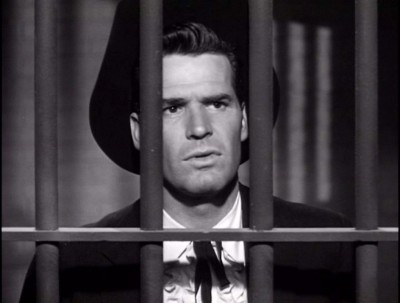
Apparently, viewers back in 1959-1960 found this third season of Maverick somewhat wanting, as well. Remarkably, despite ABC's distant third status in terms of station clearance, Maverick managed to score the Nielsen's 6th most-watched program slot of the previous 1958-1959 season (ABC was on a roll that season with rural and Western-themed hits, including The Rifleman (4th), The Real McCoys (8th), The Life and Legend of Wyatt Earp (10th), Cheyenne (18th), Sugarfoot (21st), and The Lawman (27th)). In 1959-1960, with little competition over on NBC (the last half-hour of Riverboat and the first half hour of variety show, Sunday Showcase), Maverick faced new competition from CBS' answer to Maverick's younger demographics (Maverick had destroyed venerable CBS star Jack Benny in head-to-head competition the previous year): the one-two punch of family programming block Lassie (30th) and freshman breakout hit, Dennis the Menace, with the first half-hour of a revitalized The Ed Sullivan Show (12th) against Maverick last half-hour. The kids won, with Dennis the Menace's impressive 16th ranking in the Nielsen's beating out Maverick, which dropped from the previous year's 6th place, all the way down to 19th. Maybe that rather stinging drop-off in viewer interest (people had to be deliberately tuning out, because Maverick's lead-out, The Lawman, actually rose in the ratings), was as much a factor in Garner exiting at the end of this third season, as was his rotten Warner Bros. contract.
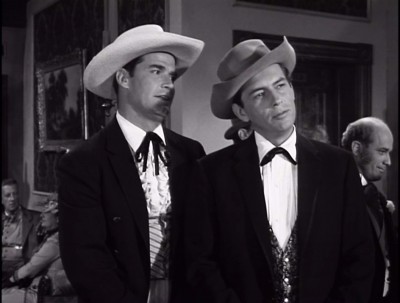
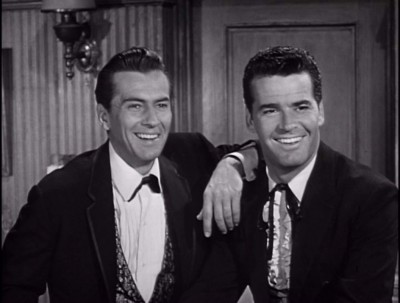
The DVD:
The Video:
The fullscreen, 1.37:1 black and white transfers for Maverick: The Complete Third Season looked quite sharp, with solid blacks that hold, good contrast (one or two episodes seemed a tad blown-out in a few scenes), and few if any imperfections.
The Audio:
The Dolby Digital English mono audio track is fine, with light hiss, some fluctuation in a couple of episodes, but nothing distracting overall. No subtitles or closed captions available.
The Extras:
No extras for Maverick: The Complete Third Season.
Final Thoughts:
Like my Pappy always told me, "If you're not happy, it's gonna show on camera." There are still quite a few entertaining, intriguing episodes to be found in this third go-around of Maverick. However, the loss of writer/producer Roy Huggins, the inevitable repetition of the show's once-innovative, quirky tone, a distracted lead in soon-to-exit Garner, and a noticeable dip in the sharpness of the scripts, all spell out a series that's beginning to lose its way. Good thing Jack Kelly still seems game. I'm still recommending Maverick: The Complete Third Season...but it's not the same.
Paul Mavis is an internationally published movie and television historian, a member of the Online Film Critics Society, and the author of The Espionage Filmography.


|
| Popular Reviews |
| Sponsored Links |
|
|
| Sponsored Links |
|
|
| Release List | Reviews | Shop | Newsletter | Forum | DVD Giveaways | Blu-Ray | Advertise |
|
Copyright 2024 DVDTalk.com All Rights Reserved. Legal Info, Privacy Policy, Terms of Use,
Manage Preferences,
Your Privacy Choices | |||||||









